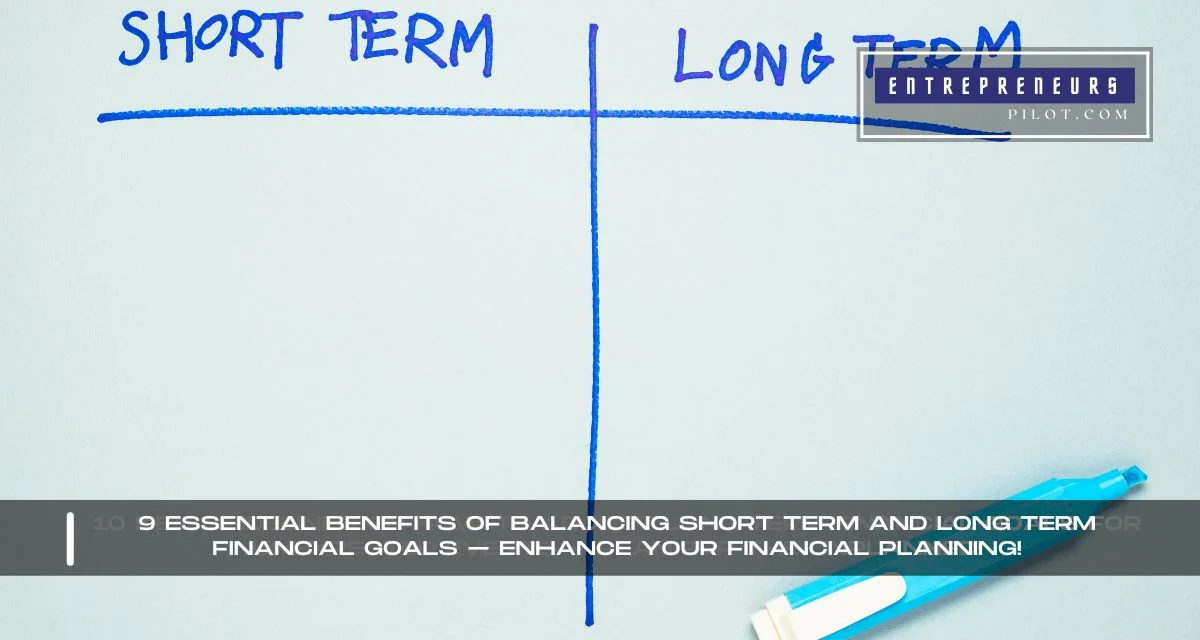Introduction
Navigating the complex world of financial planning can often feel overwhelming. Yet, understanding the art of Balancing Short Term And Long Term Financial Goals is a crucial skill that can lead to lasting financial health and security. Striking the right balance is not just about meticulous planning; it’s about empowering yourself to make informed decisions that can shape your financial future.
In this blog, we’ll explore the 9 essential benefits of effectively balancing these goals, offering insights and strategies to enhance your financial planning. Ready to unlock the secrets to a more secure financial future? Let’s dive in!
Table of Contents
1. Improved Financial Stability
Balancing short-term and long-term goals leads to a more stable financial situation. You’re less likely to be caught off-guard by unexpected expenses or market fluctuations, and more prepared to handle them without derailing your long-term plans.
2. Increased Financial Confidence
When you have a clear plan that covers both immediate needs and future aspirations, it boosts your confidence in money management. This peace of mind comes from knowing you’re on track to meet various financial milestones.
3. Better Debt Management
Understanding the interplay between short-term obligations (like credit card debts) and long-term ambitions (like mortgage payments) allows for smarter debt management strategies, reducing interest payments and improving credit scores over time.
4. Enhanced Investment Strategies
Balancing goals helps in creating a diversified investment portfolio. Short-term investments offer liquidity, while long-term investments provide growth potential, leading to an optimized portfolio suited to your financial timeline.
5. Greater Flexibility in Financial Decisions
With a balanced approach, you’re better equipped to adjust your financial plans in response to life changes, such as career shifts, family dynamics, or economic downturns, without compromising your overall financial health.
6. Accelerated Wealth Accumulation
By addressing short-term goals without losing sight of long-term objectives, you can accelerate wealth accumulation. This balanced approach ensures that immediate needs are met while steadily building your wealth over time.
7. Improved Retirement Planning
Balancing your financial goals is particularly beneficial for retirement planning. It helps in ensuring that your current lifestyle is maintained while also securing your financial future post-retirement.
8. Minimized Financial Stress
Having a balanced financial plan in place can significantly reduce stress and anxiety related to finances. Knowing that you have a roadmap for both current and future financial needs brings a sense of security and peace.
9. Legacy and Estate Planning
Balancing short-term and long-term goals is key in effective estate planning. It allows you to enjoy your wealth in the present while ensuring that your legacy and financial support for loved ones are secured for the future.
Conclusion
The journey of financial planning is both challenging and rewarding. Balancing short-term and long-term financial goals is not just a strategy; it’s a holistic approach to building a secure and prosperous future. By understanding and implementing these nine essential benefits, you can take significant steps toward achieving financial freedom and stability. Remember, the right balance can turn your financial dreams into reality!
Frequently Asked Questions
Q1: How often should I review my short-term and long-term financial goals?
A: It’s advisable to review your financial goals at least annually or whenever there is a significant change in your financial situation or life circumstances.
Q2: Can I achieve long-term goals without sacrificing short-term needs?
A: Absolutely. With careful planning and prioritization, it’s possible to meet your immediate needs while steadily working towards long-term goals.
Q3: How do I start balancing my financial goals if I’m new to financial planning?
A: Begin by clearly defining your short-term and long-term goals, assess your current financial situation, and then create a structured plan. Consulting a financial advisor can also be beneficial.
Q4: What’s the role of an emergency fund in balancing financial goals?
A: An emergency fund acts as a financial cushion for unexpected short-term expenses, ensuring that such events don’t derail your long-term financial plans.
Q5: How can I balance paying off debt with saving for the future?
A: Prioritize high-interest debts while making consistent contributions to savings. This approach helps in reducing debt burden while building a foundation for future financial goals.











